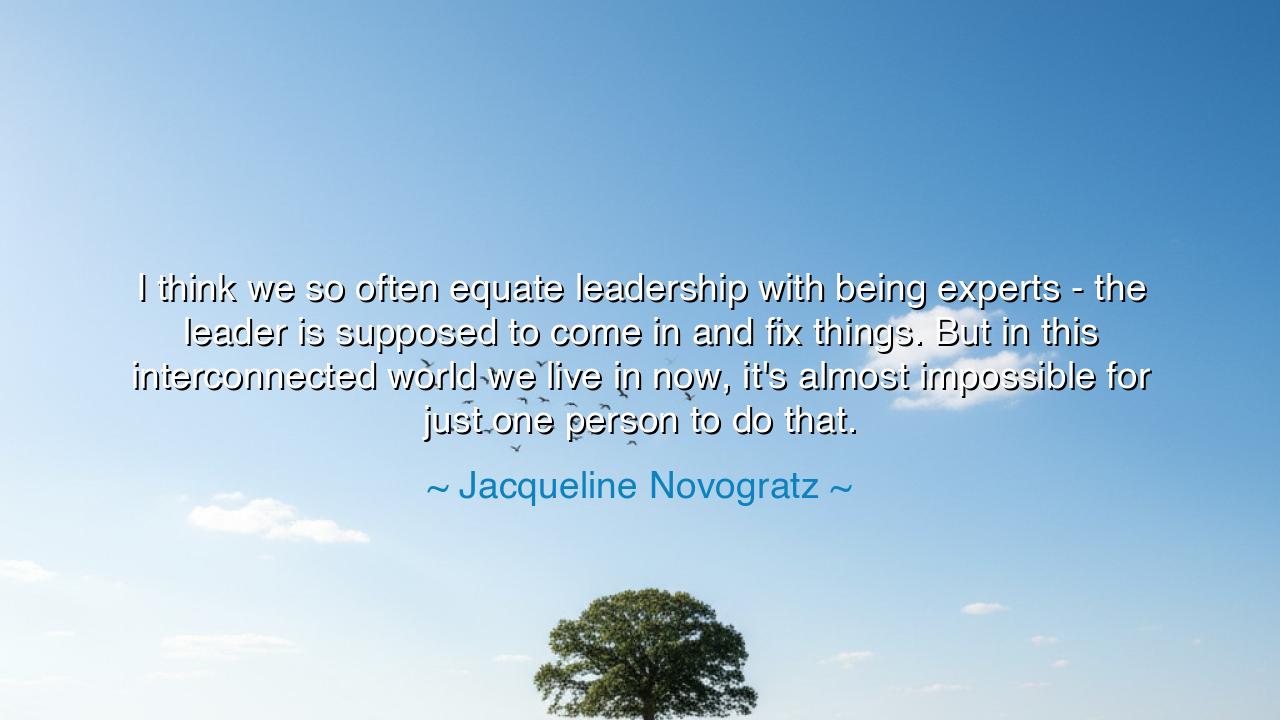
I think we so often equate leadership with being experts - the
I think we so often equate leadership with being experts - the leader is supposed to come in and fix things. But in this interconnected world we live in now, it's almost impossible for just one person to do that.






When Jacqueline Novogratz, the visionary founder of Acumen, said, “I think we so often equate leadership with being experts — the leader is supposed to come in and fix things. But in this interconnected world we live in now, it's almost impossible for just one person to do that,” she spoke with the humility and insight of one who has led not through domination, but through connection. Her words carry the resonance of a new age — an age in which leadership is no longer about command, but about collaboration; no longer about knowing everything, but about bringing people together to learn. Her wisdom reflects the eternal truth that in the vast tapestry of humanity, no single thread can hold the whole.
The origin of this quote lies in Novogratz’s life’s work — investing in social enterprises that fight poverty and injustice not through charity, but through empowerment. Her path has taken her through the villages of Africa, the streets of India, and the corridors of power in the West. There, she learned that the old model of leadership — the solitary expert who arrives to “fix” what others cannot — is inadequate in a world as complex and interwoven as ours. To lead today is not to stand above others, but to stand among them, listening, learning, and building trust across differences. Her words are the voice of a leader who understands that the age of the lone hero has ended; the age of collective wisdom has begun.
In saying that leadership is not about being an expert, Novogratz redefines power itself. The great leaders of the past — those we revere as sages, prophets, and statesmen — were not omniscient beings who knew all things. They were learners, guided by courage and curiosity. Even Socrates, the father of philosophy, began his journey by admitting, “I know that I know nothing.” His humility did not weaken his influence; it magnified it. For it was his willingness to question, to invite dialogue, to draw out truth from others, that made him a teacher for all time. Likewise, Novogratz reminds us that leadership in the modern world demands not expertise, but empathy — the capacity to see through many eyes and weave wisdom from many voices.
The world she speaks of — an interconnected world — is one of both promise and peril. No problem exists in isolation. The crisis of the environment affects the economy; the economy shapes inequality; inequality breeds instability. The leader who believes he can “fix” such complexity alone is like a sailor trying to still the ocean with his hands. In our time, the true leader is not the conqueror, but the collaborator — one who builds bridges between disciplines, cultures, and hearts. To lead in such a world is to embrace the art of coordination over control, dialogue over decree, and service over pride.
History itself confirms this wisdom. In the dark days of World War II, Winston Churchill inspired his people not because he was an expert in every field of war, but because he united others who were. He gathered generals, scientists, diplomats, and common citizens, and bound them through vision and will. Likewise, in the realm of science, Marie Curie did not advance knowledge alone; her discoveries were built upon and expanded by others who joined her in pursuit of truth. These examples remind us that greatness in leadership is not measured by solitary genius, but by the ability to summon the genius in others.
Novogratz’s insight is also a lesson in humility, a virtue often lost in the pursuit of power. The leader who believes he alone must “fix things” becomes burdened, brittle, and blind. But the one who understands that wisdom is distributed — that each person carries a fragment of truth — becomes unbreakable, for they lead with the strength of many. Leadership, as she describes it, is no longer a throne, but a circle — where each voice has value, and the leader’s task is to draw harmony from the chorus. In this, we glimpse a new archetype: not the ruler, but the weaver, who threads the wisdom of the many into the destiny of the whole.
The lesson of her words is clear and timeless: seek not to be the expert who knows everything, but the leader who learns from everyone. In every team, family, or community, there are gifts waiting to be recognized. The task of the leader is not to command, but to listen, to create space where others can rise, and to guide that rising toward a shared purpose. The one who learns to hear the voices around them will never stand alone, for they lead through relationship — and relationship is the truest form of power.
And so, let Jacqueline Novogratz’s wisdom endure as a torch for all who would lead in this age of interdependence: Leadership is not mastery, but partnership. It is not the voice that speaks the loudest, but the one that listens most deeply. To lead is to walk beside others, to learn as you guide, and to build a legacy not of control, but of connection. For in this boundless and intricate world, the strongest leader is not the one who fixes all things, but the one who helps others discover that together, they already can.






AAdministratorAdministrator
Welcome, honored guests. Please leave a comment, we will respond soon